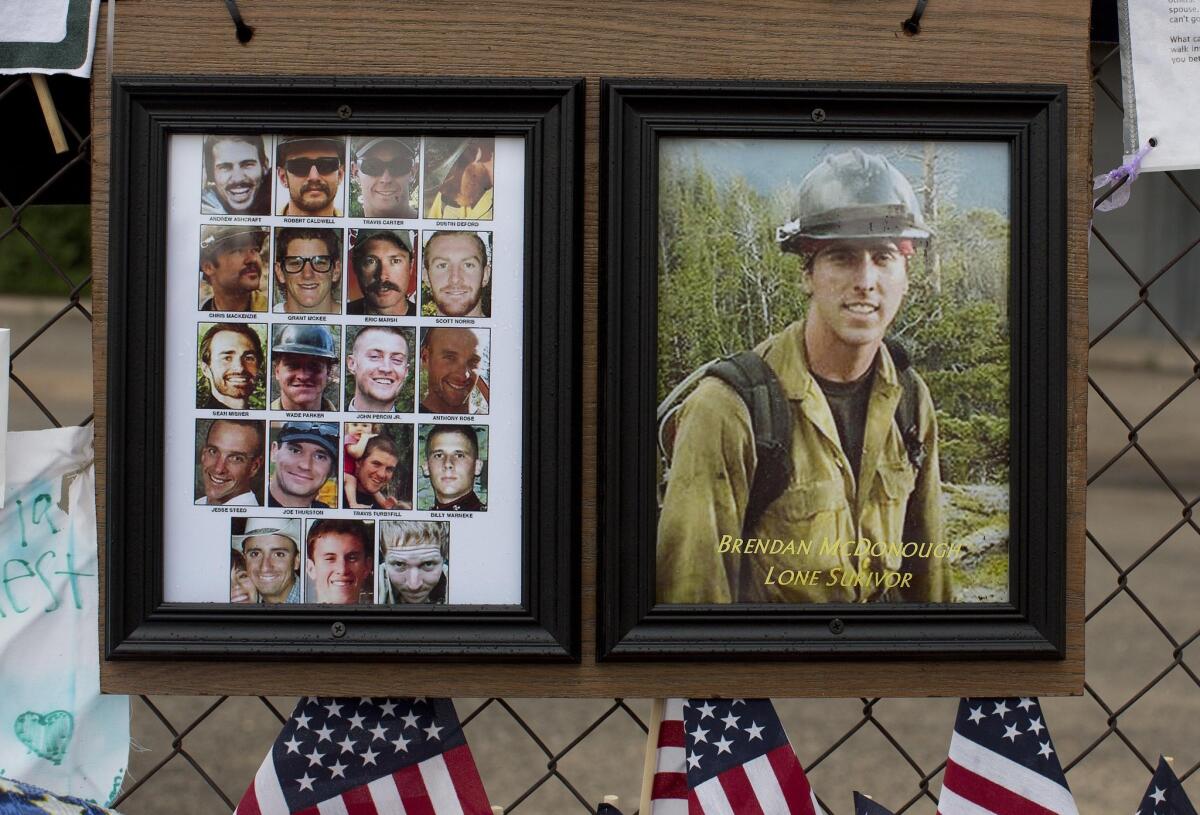What is the lone surviving firefighter from Yarnell Hill fire doing to get his reputation back?

- Share via
Reporting from Phoenix — Brendan McDonough survived one of the deadliest wildfires in U.S. history, an inferno near Yarnell, Ariz., that killed 19 of his fellow Granite Mountain Hotshots on June 30, 2013.
For the next year, he went to memorials, gave speeches and raised money for wildland firefighting. But the constant reminders of the fire wore on him. He was diagnosed with post-traumatic stress disorder and had to stop making so many public appearances.
“I kept reliving it, kept reliving it, kept reliving it,” McDonough said.
Citing his PTSD, he twice canceled depositions scheduled by the Arizona Division of Forestry, which was investigating the fire and negotiating settlements with the families of the dead. Arizonans were infuriated, then, when it was announced that McDonough would write a book about his life and the ordeal, and advise on a movie, “Granite Mountain,” which is set to begin filming this summer.
In an interview with The Times, McDonough spoke about the controversy. His responses have been edited for clarity and length.
NEWSLETTER: Get the day’s top headlines from Times Editor Davan Maharaj >>
How many times did the Division of Forestry ask to depose you, and what happened each time?
The first time they came at me, they just said “come on down for lunch and let’s talk.” I told someone and he said, “Hell [expletive] no. Even if you have nothing to hide, they’ll twist your words.” So he put me in touch with an attorney. The attorney said, “I’m not free for some time.”
The [Arizona Division of Forestry] scheduled the day he said he might be free. So there was no time to prep, and he said no.
The second time, I was talking to my counselor, and I was just getting into some real heavy [stuff], really getting into the nitty-gritty of what makes my stress, my anxiety, my PTSD tick. She’s like, “There’s no way you’re doing it right now. They can come back to us in six months or a year, if they want to do it then, we’ll do it then.”
While this is going on, everyone in the media is saying, “Brendan is hiding, he’s lying, he won’t testify, yada yada yada, he’s deceitful. He’s still writing a book, but he’s going to write something in the book he doesn’t want to testify about.”
We set up a third deposition. I wanted to shut these people up. I was ready to testify. The [Arizona Division of Forestry] canceled it the night before, like 8, 9 o’clock. More information had come out that showed [the 19 dead firefighters] didn’t make the mistakes they were accused of. I think that’s why [the Division of Forestry] canceled it.
(State records show that the deposition had been scheduled for late May 2015. The state reached a settlement with the families of the deceased firefighters on June 1, 2015.)
I’m not scared of them, I don’t fear them. The worst they can do is come to my house and put a bullet in my head.
These are the people who were supposed to take care of us. I don’t feel taken care of.
See more of our top stories on Facebook >>
So why not make a bigger deal about this, hold a news conference or something of that nature? Do you care about what the public thinks outside of the small area where you live?
No, I do care. I want to be mindful of how I’m perceived.
I’m trying not to go out in the media and say they did this to me and they did that to me. But they tried making it about me when there were 200 other people who should have been looked at, people [at the Division of Forestry] who could have made better choices.
You’re recognized near your home in Prescott, Ariz., and at firefighter memorials. It’s a weird kind of celebrity, isn’t it?
I’ve learned to just talk and listen, listen to people’s grief. That’s what I’m famous for. I’m not famous for being an Olympic gold medalist, I’m not famous for inventing the cure for cancer or anything like that. I’m famous for losing my brothers.
Do you find people using the tragedy for their own benefit?
It’s one thing to continue to honor men. But there’s other people, a very few people, taking advantage of what it is, taking grief and trauma that’s not their own. They’ve attached themselves, leeched on to my brothers’ legacy.
They’ll say, “Oh, my car just turned over to 119,000 miles,” or “Oh, I just saw 19 doves fly by.” How the [expletive] can you count 19 doves?
I had a lady, she came to one of my book signings. She was telling me the story of how she got pulled over for speeding. She had a memorial shirt on. She played it off like she didn’t use it for her advantage, but she did. She didn’t get a ticket. I’ve never done that.
Since reliving the tragedy is difficult, how do you balance the outreach you’re doing with your own mental health?
[Well-wishers] want to talk. They want to say, “I’m so sorry for your loss.” People don’t understand, that’s me reliving it. But I’m not going to tell them, “Don’t talk to me.”
When I was first in therapy, I didn’t know that it was OK to still be alive. But, I have a purpose in life. I can’t let those feelings take over.
ALSO
Court upholds net neutrality rules for Internet access
Orlando shooting investigation broadens to Afghanistan, Saudi Arabia
Juror slams judge in Stanford rape case, calls sentence ‘a mockery’ amid recall push
More to Read
Sign up for Essential California
The most important California stories and recommendations in your inbox every morning.
You may occasionally receive promotional content from the Los Angeles Times.














